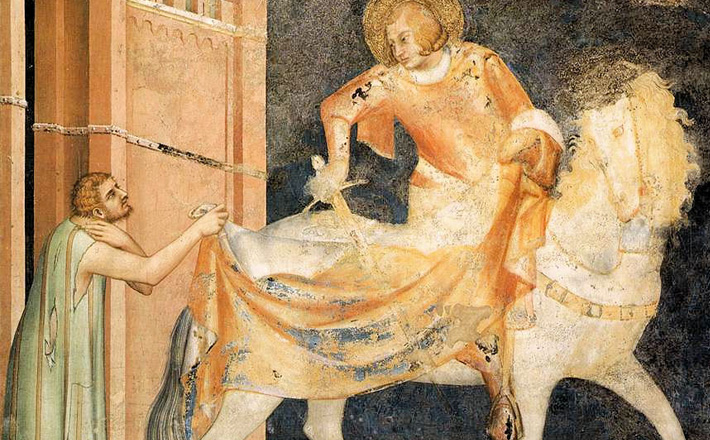Commentary on Leviticus 19:1-2, 9-18
The book of Leviticus is a minefield full of topics that nobody wants to talk about in church: animal sacrifice, blood-sprinkling, moldy walls, oozing sores, gashed flesh, “a swelling or an eruption or a spot” (Leviticus 14:56), and bodily emissions of any kind.
Here in Leviticus 19, the lectionary has managed to find a few relatively continuous verses that should not make your liturgist squirm or blush to read aloud in Sunday worship. Before we think about these verses, though, it will be helpful to consider all that is left out before, after, and in-between these lines from Leviticus 19.
The opening chapters of Leviticus (1-10) are concerned with ancient Israel’s cultic system, and particularly with the practice of sacrificial worship. Some of these same concerns are also reflected in Leviticus 19:5-8, omitted from the middle of the lectionary reading.
Much of Leviticus 11-16 is concerned with the messiness of human bodies. Yet, the Priestly authors of the book of Leviticus did not worry about bodies out of either prudishness or prurience. They didn’t even think bodies are inherently “bad,” certainly not morally offensive. All that “mess” is the stuff of life, even the source of life: “The life of the flesh is in the blood” (Leviticus 17:11, 14).
The authors of Leviticus worried about bodies because bodies, with their life-and-death messiness left unchecked, could pollute the sanctuary, the place where the community encounters God. God’s realm is holiness, and in Leviticus, impurity is the opposite of holiness. The priests must be ritually clean, and they must ensure that the sanctuary remains clean, too, lest its pollution drive God out.1
The idea that the sanctuary is holy, and that its holiness can be compromised by ritual impurity, pervades the first sixteen chapters of Leviticus. But this week’s Old Testament reading comes from chapter 19, which is part of a subsection of Leviticus called the Holiness Code. “You shall be holy, for I the LORD your God am holy”: this call to holiness is not directed to the priests alone, but rather to “all the congregation of the people of Israel” (Leviticus 19:2).
In the Holiness Code (Leviticus 17-27), holiness extends from the sanctuary “to the land and its occupants.”2 It is what sets the people of Israel apart from the peoples around them. Holiness is a mark of distinction. Impurity, while still the opposite of holiness, is no longer relegated to the realm of ritual, but instead extends to personal conduct.
Achieving holiness requires ethical behavior, not only ritual precision. Holiness is not the responsibility of the priests alone; instead, as Jacob Milgrom says, “Israel attains it and priests sustain it.”3 Holiness is dynamic, it can be achieved and lost; it requires constant vigilance. Defrauding your neighbor invites impurity just like contracting a leprous disease renders you unclean. You must keep your body in check, but you must also do what is right in the eyes of God.4
We are much more comfortable talking about the Bible’s detailed ethical regulations than its bodily ones. Ironically, though, bodily impurity is often easier to take care of. Uncleanness of the body is visible, easily diagnosed, and readily counteracted with examination by the priests, ritual baths, and spending some time “outside the camp.” Uncleanness of the heart is less easily resolved.
The practices described in this passage name the kinds of everyday injustices that not only many of us have experienced, but also that many of us have committed. There are perhaps dozens of times every day that we have the opportunity to look out for our neighbor, but we look out only for ourselves: we do not leave some of our income for the poor, we deal in falsehoods to save or make a little more money, we bear grudges against family and friends. These are the actions that should make us blush. Yet we often become so comfortable with our sins that we hardly even notice them.
Leviticus’ concern with impurity and holiness remains relevant today, even to the twenty-first-century Christian reader. The book brings to each of us the question: what in your life is impeding your encounter with God? Yet it also brings that question to our society, our culture, and our faith as a whole.
Leviticus is concerned primarily with the corporate encounter with God, not just the individual one. What distracts us from full-hearted, full-throated praise? What has become more important in our life together than love of God and love of neighbor?
Notably, Jesus’ invocation of Levitical law in Matthew 5 does not ease these overall ethical guidelines, but rather draws them tighter; after all, Jesus announces in the same chapter that he has come “not to abolish [the law or the prophets] but to fulfill” (Matthew 5:17). We are to strive to be holy like God is holy, to be perfect like God is perfect; God’s “quintessential nature” is holiness.5 Leviticus invites us to order our life together in ways that draw us closer to God.
Notes:
1 This discussion of purity and holiness in the book of Leviticus follows the analysis of Jacob Milgrom, Leviticus, 3 vols., Anchor Bible (New York: Doubleday, 1991-2000).
2 Milgrom, Leviticus, 2:1353.
3 Ibid., 2:1353.
4 The preceding two paragraphs are excerpted and adapted from a sermon the author preached on February 23, 2011, at the School of Theology at Sewanee, the University of the South, and that was printed the same year in “Tuesday Morning,” a collection of sermon helps edited by the Rev. Dr. Susanna Metz.
5 Milgrom, Leviticus, 2:1712.


February 19, 2017